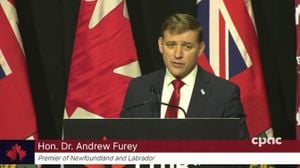The Brazilian government has unveiled significant economic measures aimed at supporting the agricultural sector amid budgetary uncertainties. On Monday, February 24, Finance Minister Fernando Haddad announced the mobilization of R$ 4.18 billion through extraordinary credit intended for the 2023 Safra Plan, which provides financing to farmers.
This funding is especially pivotal as the Safra Plan had its financing suspended starting February 20 due to delays in the approval of the federal budget for 2025. The government had experienced setbacks with the legislative process, forcing them to navigate through budgetary constraints during this key agricultural financing period.
"Despite being classified as extraordinary credit, the government is announcing it will remain within the limits of the fiscal framework. Therefore, it's as if it had been approved within the budget limits," Minister Haddad stated, highlighting the importance of adhering to fiscal responsibility even when addressing urgent financial needs. "Unfortunately, Congress has not yet considered the budget," he lamented.
This extraordinary credit is structured to assist medium and large producers, with the Treasury covering the difference between market interest rates and the more favorable rates being offered under the Safra Plan—a process referred to as equalization. The move aims to minimize the economic impact of increasing interest rates, which have surged from 10.5% annually last September to 13.25% by January 2024.
Through the Safra Plan, the Brazilian government has committed R$ 400 billion in credit to boost agricultural production, providing farmers with access to loans at lower interest rates compared to commercial offerings. This initiative plays a key role in ensuring sustained production, especially during periods of economic turmoil.
Given the recent increases in the Selic rate, the Treasury faces heightened costs associated with equalizing these subsidized interest rates, providing even greater urgency for efficient budget management. The solution of implementing extraordinary credit measures came after consultations with the Tribunal de Contas da União (TCU), which helped outline legally sound pathways for the government to secure necessary financing.
The Safra Plan’s continuity is of utmost importance, as many Brazilian farmers rely heavily on this funding to cultivate various crops and maintain operational viability. The situation remains precarious as the suspension of financing could lead to disruptions, hampering agricultural productivity at a time when food security is of global concern.
The government’s navigation of these fiscal waters indicates its commitment to supporting the agricultural sector and addressing the pressing needs of farmers. With the expectation of the budget review coming after the Carnival festivities, all eyes will be on the Congress's ability to pass the proposed budget quickly.
Analysts suggest the swift implementation of this measure may restore some confidence among farmers and stakeholders in the agricultural industry, but the overarching delays with the budget are likely to linger as potential impediments to growth.
Overall, the newly announced measures represent the Brazilian government's proactive approach to safeguarding its agricultural sector and ensuring continuity of operations for producers as they face mounting challenges. By balancing immediate economic needs with long-term fiscal responsibilities, the administration seeks to navigate these complex financial waters effectively.



